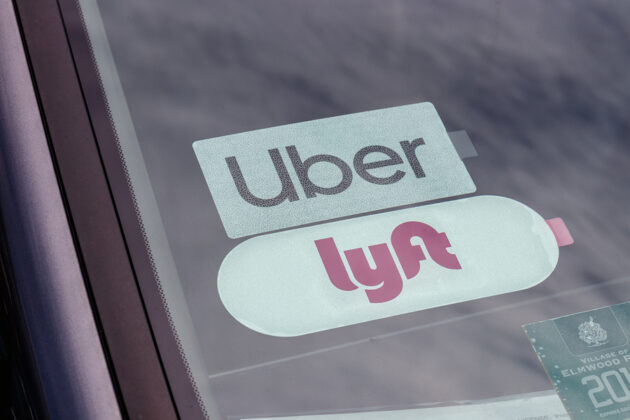
Seattle Mayor Jenny Durkan unveiled a new proposal to increase pay for Uber and Lyft drivers and cover expenses such as gas.
Durkan wants drivers to be paid at least the Seattle minimum wage, or $16.39 per hour. The plan is part of her “Fare Share” program introduced in September as a way to extend the city’s worker protections to gig economy drivers.
Durkan will transmit legislation to the City Council later this month, with plans to enact the minimum compensation standard on Jan. 1.
As we rebuild our economy and City in the wake of COVID-19, and as demand for TNC services begins to recover, we must build back better by ensuring fair wages for Uber and Lyft drivers as they are able to come back to work.
— Mayor Jenny Durkan (@MayorJenny) August 13, 2020
The city cited a University of California-Berkeley study showing that drivers in Seattle are making $9.73 per hour after expenses, and that the new mandate would increase pay for 84% of drivers with an average increase in wages of 30%. Based on that study, the city will require Uber and Lyft to pay drivers at least $0.56 per minute to “ensure drivers are paid for all of their time, including the time spent circling and waiting for a ride,” in addition to reasonable expenses.
Uber and Lyft commissioned their own study from Cornell University showing that the typical driver earned $23 per hour in Seattle after expenses.
Kevin Schofield of SCC Insight analyzed both studies last month and found that they “skew their analysis and recommendations in the direction that favors the one who commissioned their study.”
The “Fare Share” program, which increased a tax on each Uber and Lyft ride this past November, is the latest in a series of regulatory headaches for the mobility giants as regulators crack down on their labor practices.
Both companies pushed back on the mayor’s announcement Thursday. Lyft called it “unworkable” and “misguided regulation.” Here’s the company’s full statement:
“The mayor’s plan is unworkable. It would require TNCs to double pay drivers who are using multiple rideshare or delivery platforms at the same time, as well as pay people to simply have an app open, even if they are not working. This kind of misguided regulation will actually destroy jobs for thousands of people and drive rideshare companies out of Seattle.
Lyft has been clear that it supports smart benefits for drivers without taking away their independence or kicking people off the platform. In California, Lyft is offering drivers up to $367 per month for health care premiums, accident and disability insurance, and a guaranteed earnings floor that in Seattle would equal on average more than $26 per hour without kicking a single driver off the platform.”
Uber cited a similar law in New York City passed in early 2019 that increased prices and drove down ride activity. Here’s a statement from Uber:
“A nearly identical law in New York City led to massive driver protests and fewer transportation options in low-income communities in just the first year of its implementation. While we support the Mayor’s efforts to improve earnings for drivers, copying a New York City policy that resulted in a 20 percent price increase for riders and lost earnings opportunities for thousands of drivers will not help achieve our shared goals in Seattle.”
Peter Kuel, a Uber and Lyft driver in Seattle and president of the Drivers Union, a group affiliated with Teamsters Local Union 117, voiced support for the mayor’s proposal.
“The need for a Fair Pay Standard that combats racial inequity has never been more urgent than it is now for Black and brown immigrant drivers who are on the front lines of both the economic and public health impacts of the pandemic,” Kuel said in a statement. “We thank the Mayor for introducing this urgently needed measure and are eager to work with City Council to build on the plan with improved transparency and living wage protections that benefit both riders and drivers.”
Drive Forward, an Uber-backed driver organization in Seattle with nearly 2,000 members, called Durkan’s plan “disappointing.”
“If the COVID-19 pandemic has taught us anything, Americans are systemically reimagining the definition of work to a more flexible adaptive work-life balance,” Drive Forward Executive Director Michael Wolfe said in a statement. “Implementing the failed NYC system show’s Mayor Durkan and her office have not been listening to their constituents. Instead of embracing 21st Century thinking about work-life balance they are doubling down on 19th Century systems that will make drivers work when and where someone else tells them too.”
In June, the Seattle City Council unanimously approved legislation that requires food delivery companies to pay drivers $2.50 per delivery on top of their regular rates. The hazard pay is intended to offset costs and risks that drivers are dealing with during the pandemic, like acquiring protective gear and cleaning vehicles between trips. It applies to services such as Instacart and UberEats, which have seen increased usage for people sheltering at home due to the coronavirus.
This past April, the U.S. Chamber of Commerce, Uber, and the City of Seattle agreed to walk away from a lengthy and complex legal battle over a law that would allow drivers to unionize.
Uber and Lyft, meanwhile, are in a heated legal battle with California lawmakers over classifying drivers as employees. The companies are threatening to leave the state by Aug. 20.
Both Uber and Lyft have seen ridership fall dramatically due to the pandemic. Lyft reported a 61% dip in revenue in the most recent quarter, while Uber saw a 29% decline.


